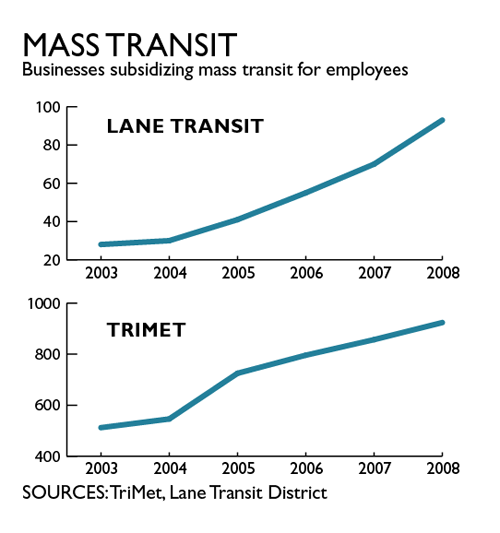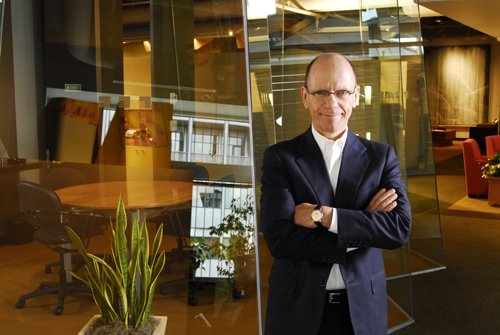 Oregon’s 100 Best Green Companies are blazing a variety of trails toward sustainability.
Oregon’s 100 Best Green Companies are blazing a variety of trails toward sustainability.
Marc Gaudin of The Joinery in Portland pioneered the use of certifiably sustainable wood for his furniture. He is also a significant supporter of wind power, carbon offsets and biodiesel. |
Oregon’s 100 Best Green Companies are blazing a variety of trails toward sustainability.
By Ben Jacklet /Photos by Anthony Pidgeon
Marc Gaudin didn’t plan on becoming a leader in the movement toward sustainable business practices when he first moved from Montana to Portland in 1982 to establish The Joinery. His goal was to make great furniture and build a company with a reputation for quality. “Green concepts weren’t as powerful then as they are today,” he recalls.
But once he tapped into that green power, Gaudin became hooked. Today he buys 100% wind power, runs his delivery truck on biodiesel, builds with sustainably harvested wood certified by the Forest Stewardship Council, purchases carbon offsets to compensate for his natural gas use and plants a tree for every customer who purchases without using a credit card.
Mark Edlen, managing principal for Portland-based Gerding Edlen Development, has undergone a similar evolution over the past decade. It started with a focus on energy conservation, morphed into a commitment to the principles of Leadership in Energy and Environmental Design (LEED), and has led him to his current quest to create skyscrapers that generate more energy than they use and waste no water. “We’re closer than you might think,” he says. “I would like to see us accomplish this over the next three years.”
Given their long records of combining green ethics with profits, it makes sense that
Mark Edlen of Portland-based Gerding Edlen Development is a nationally recognized leader in the shift toward green building. His goal is to develop buildings that create more energy than they use. |
Gerding Edlen and The Joinery fared well in our first annual 100 Best Green Companies to Work For in Oregon survey, ranking first and seventh respectively. They join a host of green icons such as Sokol Blosser Winery (No. 6) and Rose City Mortgage Specialists (No. 5) as well as lesser-known but equally committed businesses seeking to blaze multiple trails toward the economy of the future.
The rankings came from confidential surveys completed by nearly 30,000 employees at 372 companies that gauged employee satisfaction and support for their organizations’ sustainable practices. Company officials also had to supply a report on their green efforts.
The results offer a wide-angle portrait of green innovators from every corner of the state’s business community. Among the businesses making our 100 Best Green list are:
DeSantis Landscapes (No. 41), a Salem landscape company that runs on biodiesel and brews its own compost tea.
McKinstry (No. 50), a Seattle-based construction company that recently purchased five Toyota Priuses for employee use and is pursuing LEED gold certification for its new Portland offices.
Portland-based Jive Software (No. 70), which gives bicycle commuters a bonus of $85 per month.
Medford-based fruit processor Sabroso Company (No. 35), twice recognized by the U.S. Department of Energy’s “Save Energy Now” program.
PakTech (No. 19), a Eugene plastics manufacturer that has invested $2.5 million on machines and chilling equipment to cut energy use and emissions by 60%.
Others making the 100 Best Green list have attacked food waste through composting, paid a premium to buy 100% wind power, limited or even banned paper at the office, installed solar panels on their roofs, purchased transit passes to coax commuting employees out of their cars and switched to vendors who share their green ideals.
These companies have gone beyond the increasingly common practice of claiming to be green to proving it, by incorporating sustainability into their budgets, business plans and company cultures. They are at the leading edge of a business transformation that can be quantified objectively through the soaring numbers of Oregon companies investing in renewable energy, green buildings, efficiency upgrades and comprehensive recycling programs. It also can be measured qualitatively through the insights of the people who know these companies the best: their employees.
Rosy Boyer, showroom sales manager at The Joinery, never thought she would work in a furniture shop again because of her chemical sensitivity. Convinced that exposure to formaldehyde and flame retardants at a previous job was damaging her health, she considered leaving the field altogether before moving to Portland and learning about The Joinery’s use of soy and linseed oil wood finishes and other green practices. “I didn’t think it was actually possible to be committed to sustainability at this level and still be profitable,” she says.
Brian Bessler, a customer service representative and co-chairman of the Anthro Corp. (No. 13) green team, echoes that theme when he says the company’s measured commitment to reducing waste and energy use is “one of the big reasons people love working here.” Anthro, which designs and manufactures office furniture in Tualatin, has achieved a waste recovery rate of more than 70% as measured by its waste hauler, compared to the industry average of 40% to 50%. “People take a lot of pride in that here,” says Bessler.
Craig Thompson, the general manager of Hotel Monaco in downtown Portland, says that while green initiatives can create more work for employees, they can also offer a sense of meaning. “If you look at the average age of hotel workers, it’s pretty young,” he says, “and there is definitely a feeling among the younger generation that things need to change.”
In that spirit, Thompson selected 26-year-old receptionist Colleen Kelly to oversee the Monaco’s effort to win the lodging industry’s Green Seal of approval after spending $30,000 to convert all of the hotel’s lighting to compact fluorescent bulbs and updating the food composting program. Thompson says the green seal was a deciding factor in landing a major account with Wells Fargo. It also helped earn the Portland hotels and restaurants run by San Francisco-headquartered Kimpton second place on the 100 Best Green Companies list.
Portland-based Doubletree Hotel also scored well for environmental performance, ranking third on the strength of its biodiesel shuttle service, door-to-station MAX train service to the airport and carbon calculating services to raise awareness among employees and guests.
As major users of water, electricity and cleaning products, hotels had a lot of opportunities for sustainability reforms. Similar challenges apply to large-scale landscaping, with its historical emphasis on heavy water use and chemical applications. With that in mind, Dean DeSantis has created a niche for DeSantis Landscapes by becoming Oregon’s first certified Eco-Logical landscaper through a rigorous EcoBiz program overseen by the state Department of Environmental Quality. DeSantis, who has run his company’s vehicles on biodiesel for years, has cut pesticide use by 75% over five years. He is also leading his company into the growing field of brewing compost tea, concentrated concoctions of organic matter reduced to liquid form, custom-made for parcels of land based on soil samples.
“My employees are inspired by this stuff,” DeSantis says. “They’re motivated to do the research and find out what the next big thing might be. It keeps them engaged and constantly innovating.”
 Brewing up your own earth tea is one thing. But what about manufacturing plastic handles? How green can that possibly be?
Brewing up your own earth tea is one thing. But what about manufacturing plastic handles? How green can that possibly be?
PakTech (No. 19), which cranks out 34 millon plastic handles per month for big-box stores at its 100-employee factory in Eugene, has been trying to find out. The family-run company has trimmed its power use and emissions by 60%, buys renewable energy and offers transit passes and bicycle parking for all its employees. “We’re always looking for ways to improve efficiency and cut waste,” says marketing manager Amie Thomas.
The same holds true for another Eugene firm investing in sustainability, Isler CPA. Isler formally incorporated green practices into its business plan and budget after hiring a Eugene consultant called (seriously) Good Company to audit its environmental performance. Isler started with small steps such as verifying its office and cleaning products were nontoxic and biodegradable, then followed up with solar panels on the roof last November.
The panels provide power onsite, and they also help Isler recruit top candidates from the University of Oregon. “This stuff is really important to the younger generation when we’re recruiting on campus,” says managing partner Bruce Heldt. “They want to work somewhere with a responsible record of doing business in a sustainable manner.”
That may help explain the steady flow of applicants hoping to join the team at Sokol Blosser Winery. What started as a personal crusade by co-founder Susan Sokol Blosser has evolved into a meticulously detailed approach to sustainable wine making, overseen by co-presidents Alexander and Allison Sokol Blosser. Their initiatives to grow their grapes organically, generate solar power at the winery and recycle, re-use or compost everything they use have earned them loyalty from employees and respect throughout the wine industry. Their long-term goals are even loftier: to generate more energy than they use, offset more carbon than they burn and waste nothing.
As for the short term, there is this small matter of global financial crisis. Even the Sokol Blossers have had to re-examine green deals such as paying a 35% premium for certifiably sustainable cork. Other green stalwarts have trimmed spending to retreat into survival mode. Renewable energy projects and green buildings are on hold awaiting financing, investments are dwindling and companies with high ideals are suffering layoffs and pressure from lenders.
Can they keep it up? Will the green icons lead the way to recovery or stall under the weight of idealistic spending?
Is the sustainability movement actually sustainable?
Time will tell. But the consensus from Oregon’s 100 Best Green Companies is a resounding yes. Eventually the economy will recover, and one of the drivers of the recovery is expected to be an aggressive shift toward a low-carbon, high-efficiency future.
“Once we navigate beyond the morass we are in, the opportunities will be limitless,” predicts Edlen.
Besides, adds Heldt: “You have to take the long view. This is the only planet we have.”




